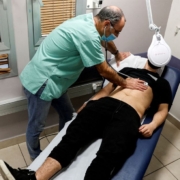An Oxford University study has found that COVID-19 can cause the brain to shrink, reduce grey matter in the regions that control emotion and memory, and damage areas that control the sense of smell.
Research Roundup: ADHD Drug Appears to Delay Alzheimer’s Symptoms and More
ADHD, Alzheimer’s disease, Brain, Clinical Trials, COVID-19 booster shots, Dementia, Exercise, HIV, Medical Journals, Memory, mRNA-1273/Moderna COVID-19 Vaccine (Moderna), Omicron (B.1.1.529) (South Africa), R&D, Therapeutics, Tuberculosis, TumorsResearchers at Emory investigated the use of an FDA-approved ADHD medication on patients with mild Alzheimer’s symptoms and found it appeared to reduce levels of tau.
The U.S. Food and Drug Administration granted breakthrough therapy designation to Japanese company Eisai and partner Biogen’s experimental therapy lecanemab for patients with early Alzheimer’s.
U.S. regulators on June 7 approved Biogen Inc.’s aducanumab as the first treatment to attack a likely cause of Alzheimer’s disease despite controversy over whether the clinical evidence proves the drug works, sending the company’s shares soaring.
A study published in the Journal of the American Medical Association shows that a new blood test may be helpful for detecting Alzheimer’s disease as early as 20 years before the onset of cognitive impairment.
What if we could look inside the minds of HCPs to see what is happening there during industry events and interactions?





